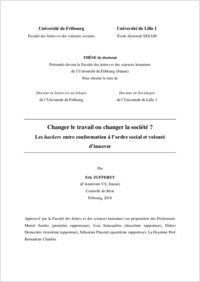Changer le travail ou changer la société ? : Les hackers entre conformation à l'ordre social et volonté d'innover
- Zufferey, Eric
- Surdez, Muriel (Degree supervisor)
-
2018
1 ressource en ligne (428 p.)
Thèse de doctorat: Université de Fribourg, 2018
Pirates informatiques
Criminalité informatique
Changement social
Autodidaxie
Mobilité sociale
Socialisation
Insertion professionnelle
Participation politique
Militantisme
Suisse
France
hacking
autodidaxie
socialisation
mobilité sociale
professionnalisation
politisation
Suisse
France
hacking
self-directed learning
socialization
social mobility
professionalization
politicization
Switzerland
France
English
French
Changing workplace or society? Hackers between compliance with the social order and the will to innovate. This thesis looks at hacking as source of social change, or even subversion of the social order. Hacking involves self-directed learning and remove social barriers between hobbyists, professionals and activists. Therefore, it raises the hope to renew the access to knowledge and the role of technologies in society. In line with the bourdieusian thought on reproduction of social inequalities, the study analyses how hacking articulate itself with the classical instances of socialization –family, friends, school system, etc. –and how it influences social mobility. By studying Swiss and French hackers, it shows that self-directed learning varies according to social origins and trajectories: it enables upward trajectories when it is combined with the legitimate scientific culture. In this regards, hackers do not escape the weight of social classes’ relations, although they are willing to transfer their unusual behaviors and thought process across different areas of activities. Workplace is generally their main focus. Along with careerpath, success or failures to innovate in the professional sphere are key to understand the hackers’ involvement in leisure activities, associations, or various forms of activism. The participation in the political sphere is limited because hackers usually do not have the proper ressources. By highlighting the complexity of hacking, the thesis proposes a better understanding of its potential societal impacts.
Cette thèse vise à interroger le hackingcomme source de changement social, voire de subversion de l’ordre social. En mettant en jeu une forme d’autodidaxie et un décloisonnement social entre amateurs, professionnels et militants, il fait espérer des changements dans l’accès aux savoirs, ainsi que dans les manières de penser le rôle de la technologie au sein de nos sociétés. Dans le prolongement d’une sociologie bourdieusienne, l’enquête analyse comment la pratique du hackings’articule aux instances classiques de la socialisation –famille, amis, institutions scolaires, etc. –et examine quels types de mobilité sociale elle produit. En partant des cas de hackerssuisses et français, nous montrons que l’autodidaxie se décline différemment selon l’origine sociale et la trajectoire: elle permet lestrajectoires les plus ascendantes lorsqu’elle se combine avec la culture scientifique légitime. En cela, les hackersn’échappent à la pesanteur des rapports sociaux de classes, alors même qu’ils développent une propension à transférer leurs manières d’agir et de penser atypiques dans différentes sphères d’activités. La thèse montre que le travail est la principale cible de leurs investissements. Les succès ou les échecs à innover dans la sphère professionnelle expliquent pour une large part les investissements des hackersdans des activités de loisirs, des associations ou des formes de militantisme. Les implications dans la sphère politique restent limitées et ponctuelles, car y accéder suppose d’autres ressources que celles possédées par les hackers. Mettant en évidence la diversité du hacking, ce travail permet d’appréhender la complexité de ses potentiels impacts sociétaux.
- Faculty
- Faculté des lettres et des sciences humaines
- Language
-
- French
- Classification
- Demography, sociology, statistics
- Notes
-
- Ressource en ligne consultée le 12.06.2019
- License
- License undefined
- Identifiers
-
- RERO DOC 326663
- URN urn:nbn:ch:rero-002-118400
- RERO R008934028
- Persistent URL
- https://folia.unifr.ch/unifr/documents/307934
Statistics
Document views: 367
File downloads:
- ZuffereyE.pdf: 358
